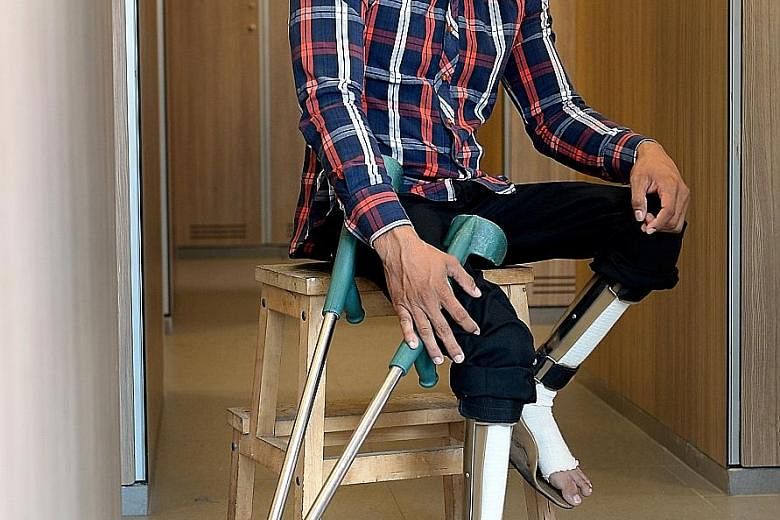Cambodian Longdy Chhap was five years old when he was struck with polio and lost the use of his legs. When he was 10, a broker convinced him that, instead of being a burden to his family, he should go to Thailand to work; he was promised good money and living conditions. He agreed.
When he got to Thailand, he was forced to beg on the streets. For six years, he was abused and beaten and faced starvation and arrest, before he was finally rescued and sent to Hagar Cambodia, a human rights organisation.
At the recent Trust Forum Asia in Singapore, hosted by Thomson Reuters and its Foundation, Longdy, now 25, choked and broke down a few times while telling his story. Many in the 200-strong audience were visibly moved.
Londgy's story was one of many shared that day about modern-day slavery - a growing trade that the International Labour Organisation estimates is generating illegal profits worth over US$150 billion (S$207 billion) a year.
Slavery takes many forms today, including forced or bonded labour, human trafficking, descent-based or child slavery, and early or forced marriages. It is an issue that is traditionally under-reported because of the clandestine conditions surrounding trafficking. Globally, about 36 million people live as modern-day slaves, according to Walk Free, an anti-slavery non-profit organisation, and 60 per cent of them are enslaved in Asia.
Human trafficking in Asia has been in the global spotlight in recent years, since the Associated Press ran a Pulitzer Prize-winning series of stories exposing rampant corruption and slavery in Thailand's billion-dollar fishing industry. The increased scrutiny has forced the Thai government to implement reforms, and businesses to review their supply chains for abuse. Britain and the United States have tightened laws to punish those complicit in human trafficking.

This progress is long overdue in an era of globalisation where the rising affluence of an expanding middle class has driven mass production of cheap goods and services made possible by low-cost or forced labour.
Apart from the fact that this is morally wrong, research has shown that forced labour has broader social and economic costs in terms of hampering development and perpetuating poverty. There is also a strong link between slavery and environmental degradation. In certain industries that face high environmental risks such as agriculture, fishing, logging and mining, the use of forced labour is often documented. The exploitation of both people and the environment is even more likely when these activities take place in areas where monitoring and legal enforcement are weak.
This is why it is important that we look with a critical eye at these supply chains and at loopholes in legal systems so as to stamp out slavery in all its forms.
Singapore does not house these particular industries, but forms of exploitation of foreign workers do take place here, including deceiving workers into sex work, forced labour or servitude, which by some international standards constitutes human trafficking. In clear-cut cases, Singapore's new Prevention of Human Trafficking Act provides some legal recourse for victims.
Still, there are many practices that fall into grey areas. These include charging foreign workers unreasonably high fees to enter the country, then making them work long hours for little pay, giving them no days off, or threatening them with repatriation if they wish to leave their jobs. Some foreign workers also have to endure squalid living conditions, poor-quality food and verbal or physical abuse, and have little or no medical support.
Such exploitation of workers - even if not illegal - goes against Singapore's aspirations to become an inclusive and vibrant global city.
The Government has in recent years made significant progress in addressing the work conditions of migrant workers, including instituting a weekly rest day for foreign domestic workers, written employment terms and itemised payslips. There is also a law requiring large worker dormitories to meet minimum living standards. Even so, there remains much to do.
The proportion of domestic helpers who get a regular day off each week remains below 50 per cent, according to a 2014 survey by charity Transient Workers Count Too. Some other less obvious forms of control that violate international standards include keeping a helper's passport, confiscating her phone and "safekeeping" her wages.
Some contractors still provide foreign workers with poor, cramped accommodation infested with bugs, and get doctors to collude with them to give less sick leave than the workers are entitled to.
Singapore needs to take a stand against such practices. If it does not, other countries will - as Indonesia did this week, when it announced that it would stop sending new live-in maids abroad from as early as next year. Its authorities want domestic workers to live separately from their employers, in dormitories, to work regular hours, and to get public holidays off and weekly rest days.
The Singapore Government can take the lead by first regulating recruitment fees so workers can avoid debt bondage. The law should require employers to pay for a worker's transport and recruitment fees, and errant local and overseas recruiters should be barred from bringing migrant workers into Singapore.
Workers should be given the right to change employers as well. Currently, they can do so only with their employer's consent.
As for businesses, they should look deep into their supply chains for signs of forced labour, and insist that their contractors end such abuse.
Individual Singaporeans must step up too, by educating themselves on the issue so as to hold businesses and government to account. Although such complex issues are unlikely to be resolved overnight, everyone can contribute to change through their actions, by choosing to buy only products that are responsibly produced and by treating their domestic helpers with dignity and respect.
Modern slavery in all its forms needs to be tackled because, to quote American civil rights activist Martin Luther King Jr, injustice anywhere is a threat to justice everywhere.
•Jessica Cheam is the editor of Eco-Business, an Asia-Pacific sustainable business online publication. This is a fortnightly column on the environment.



